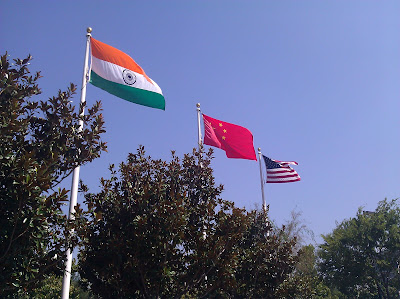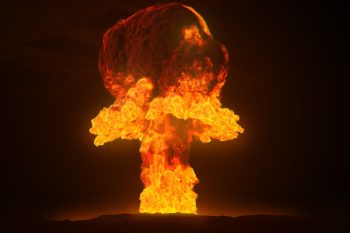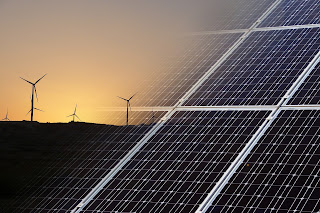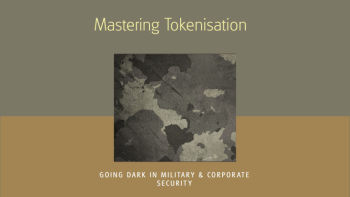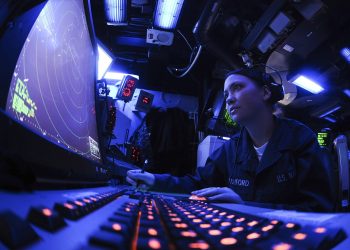CHINA: U.S. Escalates Chips War With China – ORF on GEO´
11 April 2023
Global geopolitics is in a state of intense flux. China’s rise has led to greater competition in the international system, with the United States and the post-War global order coming under increasing challenge. China’s high economic growth rate in the past several decades has meant bigger military budgets. In turn, its military rise threatens security in the Indo-Pacific region where China seeks to dominate, from the Himalayas to South China Sea and East China Sea. This paper argues that China’s massive military power, accompanied by its threat or use of force and aggressive actions against its neighbours has heightened insecurity across the Indo-Pacific. Yet, the China challenge is multifaceted and not just in the domain of the military. This paper focuses on the area of technology.
Introduction
The US-China technology and trade war is reaching new heights, as the United States imposed a new round of technology controls on China in October 2022. These controls will affect “the flow of high-end semiconductors and semiconductor-manufacturing equipment to Beijing.” The wave of US sanctions began in 2019 as a nascent effort by the Trump Administration to limit the Chinese telecommunications giant Huawei’s growing footprint in multiple regions across the globe. With the competition picking up momentum across various technologies, including military and security utilities, efforts to restrict China’s access to technologies including semiconductors (or chips) and other components will likely become widespread. The US has in recent months also said that it will take “extraterritorial measures” if its allies and partners do not follow its lead in the imposition of the new measures.
The European Commission, in an effort to strengthen the continent’s competitiveness in the area of semiconductors, introduced the Chips Act in 2022 that primarily seeks to double Europe’s market share from the current 10 percent to at least 20 percent by 2030. The Act includes a number of different steps to secure Europe from semiconductor supply vulnerabilities: beefing up investments in next-generation technologies; giving access across Europe for designing tools and pilot lines for the prototyping, testing and experimentation of cutting-edge chips; ensuring a more investor-friendly structure that would aid in establishing manufacturing facilities in Europe; and instituting certification procedures for energy-efficient and trusted chips to guarantee quality and security for critical applications.
The law also seeks to assure start-ups and SMEs better access to equity finance; further skills, talent and innovation in microelectronics; build capabilities to predict and respond to possible semiconductor shortages and crises to remove supply vulnerabilities; and develop semiconductor partnerships with like-minded countries across the globe. According to media reports, the Chips Act will allow for a spending of 15 billion euros (approx. US$17.11 billion) in both public and private investments until 2030.
This paper describes the intensifying US-China tech war; examines the logic of this tech war; and explains the new US export control measures that have been instituted in recent months with the goal of restricting the technology flow to China. It also looks into China’s domestic efforts in recent years to mitigate the repercussions of US restrictions.
U.S.-China Tech Competition: An Overview
Competition in the semiconductor industry has accelerated in recent years. Semiconductors, or chips, are key to a number of critical technologies such as 5G, AI, autonomous electric vehicles, and the internet of things (IoT). Many of these technologies are of important strategic value in the context of the changing nature of warfare, and countries’ defence departments are among the potential beneficiaries as automation and digitalisation pick up greater traction in military affairs. Pat Gelsinger, CEO of Intel Corporation, in his Senate testimony in March 2022 remarked that the increasing requirement of semiconductors pushed by growing digitalisation has become particularly acute in the last few years. Consequently, the huge growth in demand has led to critical shortages in semiconductors globally. According to the 2022 annual report of the US-based Semiconductor Industry Association, the heavy demand for digital connectivity necessitated by the pandemic along with “significant fluctuations in chip demand for other products such as cars, triggered a supply-demand imbalance felt across the world.”
Countries that have semiconductor production capacities are indeed better placed to dominate the global market. The US and a few of its partner countries have so far succeeded in this regard, although there are several others that are beginning to invest in the domain. China, clearly recognising the critical role of semiconductors across multiple sectors including the military, has made one of the biggest investments to the tune of 1 trillion yuan (US$1.45 billion). However, it has yet to reap the benefits of such heavy investments and is beginning to rethink this policy approach. Without access to components produced in the West, China cannot manufacture high-end chips that use highly advanced semiconductor nodes.[10] Commenting on China’s predicament, Andrew Buss, IDC Research Director for European Enterprise Infrastructure, said that “we will see China looking more internally, with manufacturers such as SMIC serving the domestic market instead of being a foundry for Western companies.”
Sharing this viewpoint, Richard Gordon, practice vice president for semiconductors and electronics at Gartner, said that while China may focus on “using its semiconductor industry to service its own internal consumption more in future” it is unlikely that “they [China] will stop throwing money at the problem, but the bigger issue is that it requires expertise and time, and it will take a very long time.” With the US-China competition picking up, Taiwan finds itself at centre-stage with the Taiwan Semiconductor Manufacturing Company (TSMC), which produces the chips that companies like Apple, Qualcomm, Broadcom, Arm and Nvidia design. TSMC produces 84 percent of the most advanced chips globally.
New U.S. Regulations
The US enforces a number of federal regulations aimed at restricting technology flows. These include the State Department’s International Traffic in Arms Regulations (ITAR), which enforces the Arms Export Control Act (AECA), and the Department of Commerce’s Export Administration Regulations (EAR) implemented by the US Department of Commerce’s Bureau of Industry and Security (BIS). The BIS’ regulated items are contained in the Commerce Control List (CCL).In October 2022, the BIS initiated critical policy changes that involve “additional export controls on certain advanced computing semiconductor chips (chips, advanced computing chips, integrated circuits, or ICs), transactions for supercomputer end-uses, and transactions involving certain entities on the Entity List.” BIS “has also adopted additional controls on certain semiconductor manufacturing items and on transactions for certain IC end use.”
With this policy shift, the BIS has also amended the Export Administration Regulations (EAR), which includes an addition of 31 persons to the Unverified List (UVL) as well as removing nine persons from the UVL after the BIS was able to verify their bona-fides. The Unverified List includes parties to whom technologies, hardware or software cannot be transacted because the BIS could not “verify their bona-fides.” If, “for reasons outside the US Government’s control”, the BIS has been unable to complete “satisfactorily” an “end-use check” with regard to a particular party, the party is then added to the UVL. The new additions and deletions are all from China. BIS noted that 31 persons had to be included since it was “unable to verify their bona-fides because an end-use check could not be completed satisfactorily for reasons outside the U.S. Government’s control.” Nine parties were removed from the UVL “because the BIS was able to verify their bona-fides.” These actions have the effect of “choking off China’s access to the future of AI.”
These policy changes come in the backdrop of the Biden Administration’s CHIPS and Science Act of August 2022 that the US hopes will reinforce the country’s leadership in semiconductor technology, by strengthening domestic research, development, and production capacity. A White House Fact Sheet noted that this Act will “strengthen American manufacturing, supply chains, and national security, and invest in research and development, science and technology, and the workforce of the future to keep the United States the leader in the industries of tomorrow, including nanotechnology, clean energy, quantum computing, and artificial intelligence.” The signing of the CHIPS and Science Act immediately pushed for significant investment in the US semiconductor manufacturing with companies investing US$50 billion, pushing the total business investment up to US$150 billion since Biden became president in January 2021. The CHIPS and Science Act is a combination of two bipartisan bills, both aimed at stepping up US competitiveness in high-end technologies: the Endless Frontier Act aimed at enhancing investment in high-tech research, and the CHIPS for America Act whose goal is to revive semiconductor manufacturing in the US.
Learn More /…
Attribution: Rajeswari Pillai Rajagopalan, “The U.S. Escalates Chips War With China,” ORF Occasional Paper No. 397, April 2023, Observer Research Foundation.
About Dr Rajeswari Pillai Rajagopalan
Dr Rajeswari (Raji) Pillai Rajagopalan is the Director of the Centre for Security, Strategy and Technology (CSST) at the Observer Research Foundation, New Delhi. Dr Rajagopalan was the Technical Adviser to the United Nations Group of Governmental Experts (GGE) on Prevention of Arms Race in Outer Space (PAROS) (July 2018-July 2019). She was also a Non-Resident Indo-Pacific Fellow at the Perth USAsia Centre from April-December 2020. As a senior Asia defence writer for The Diplomat, she writes a weekly column on Asian strategic issues.
Learn More /…
About ORF
ORF began its journey in 1990 at the juncture of ideation tempered by pragmatism. During the period of India’s transition to a new engagement with the international economic order, several challenges emerged, evoking a need for an independent forum that could critically examine the problems facing the country and help develop coherent policy responses. ORF was thus formed, and brought together, for the first time, leading Indian economists and policymakers to present the agenda for India’s economic reforms. Learn More /…
About GEO´ PRWire Channel
Our PR Wire Channel Management Team provide direct, immediate, highly cost-effective access to our entire Geopolitical contacts network including our proprietary Userbase of 232k* individually named, profiled & GDPR compliant CSuite industry influencers and policy makers, across the Banking & Finance, Insurance, Manufacturing, Technology, Aviation and Maritime industries as well as NGOs and Government Departments Worldwide.(*Up 41% year on year) About GEO´ PRWire Channel
Our PR Wire Channel Management Team provide direct, immediate, highly cost-effective access to our entire Geopolitical contacts network including our proprietary Userbase of 232k* individually named, profiled & GDPR compliant CSuite industry influencers and policy makers, across the Banking & Finance, Insurance, Manufacturing, Technology, Aviation and Maritime industries as well as NGOs and Government Departments Worldwide.(*Up 41% year on year)
Post your First Release Free!



